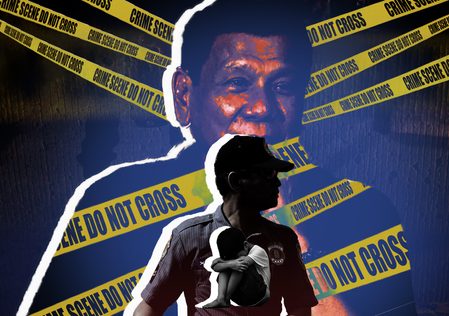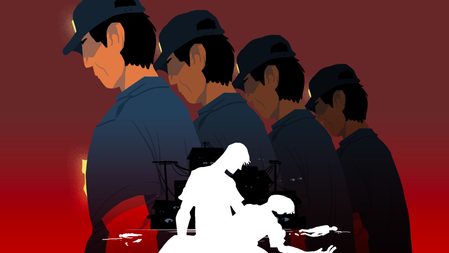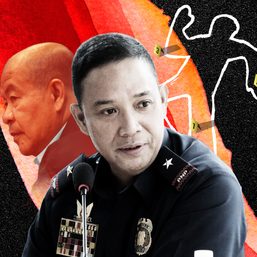SUMMARY
This is AI generated summarization, which may have errors. For context, always refer to the full article.
![[OPINION] So we don’t forget: Duterte’s case with the ICC](https://www.rappler.com/tachyon/2023/05/delay-justice-duterte-icc-may-3-2023.jpg)
When the Philippines came to the attention of the International Criminal Court (ICC) in the Hague, Netherlands, it joined the ranks of countries such as Uganda, the Democratic Republic of the Congo, Darfur, Sudan, the Central African Republic, Kenya, Libya, Côte d’Ivoire, Mali, Georgia, Afghanistan, Burundi, Palestine, Nigeria, Colombia, and Venezuela. You will agree, Reader, that this is not exactly the best company for the Philippines to keep.
And when, exactly, did we get into the gunsights of the ICC? Here is the timeline:
13 October 2016: President Duterte had just completed his first 100 days in office – when then ICC Prosecutor Fatour Bensouda issued a statement concerning the Situation in the Philippines, as follows: “My Office is aware of worrying reported extra-judicial killings of alleged drug dealers and users in the Philippines, which may have led to over 3,000 deaths in the past three months. I am deeply concerned about these alleged killings and the fact that public statements of high officials of the Republic of the Philippines seem to condone such killings and further seem to encourage State forces and civilians alike to continue targeting these individuals with lethal force.
“Extra-judicial killings may fall under the jurisdiction of the International Criminal Court if they are committed as part of a widespread or systematic attack against a civilian population pursuant to a State policy to commit such an attack.
“The Republic of the Philippines is a State Party to the ICC and as such, the Court has jurisdiction over genocide, crimes against humanity and war crimes committed on the territory or by nationals of the Philippines since 1 November 2011, the date when the Statute entered into force in the Philippines.
“Let me be clear: any person in the Philippines who incites or engages in acts of mass violence including by ordering, requesting, encouraging or contributing, in any other manner, to the commission of crimes within the jurisdiction of the ICC is potentially liable to prosecution before the Court.
“My Office, in accordance with its mandate under the Rome Statute, will be closely following developments in the Philippines in the weeks to come and record any instance of incitement or resort to violence with a view to assessing whether a preliminary examination into the situation of the Philippines needs to be opened.”
The facts in the statement are all correct, it is safe to say. The news reports at that time placed the “over 3,000 deaths” to a more precise 3,700 deaths.
What was President Duterte’s reaction? Presidential Communications Secretary Martin Andanar stated that “In any case, the President has articulated that he is willing to submit himself [to] an investigation [by] anybody.” Famous last words.
24 April 2017 or six months later: Filipino lawyer Jude Sabio, files a 78-page complaint in the ICC against Duterte and 11 other government officials (including now Senator ‘Bato’ de la Rosa), charging them with mass murder and crimes against humanity.
The complaint cited the murders of at least 1,400 people by the Davao Death Squad (DDS) while Duterte was Davao City mayor, and the killing of at least 7,000 people during his presidency (from “over 3,000 people” six months before).
Aside from Sabio, the rights advocacy group Rise Up for Life and for Rights also filed a case. Subsequently, at least three other local and international non-government organizations filed, according to the Commission on Human Rights.
In 2020: Sabio withdraws his complaint but the ICC stated that any submissions to it could not be withdrawn.
8 February 2018: Bensouda issues a statement:
“Following a careful, independent and impartial review of a number of communications and reports documenting alleged crimes potentially falling within the jurisdiction of the International Criminal Court, I have decided to open a preliminary examination into (the) situation…”
Note, Reader. This is just a preliminary examination, “a process of examining the information available in order to reach a fully informed determination on whether there is a reasonable basis to proceed with an investigation.”
Time elapsed between concern and decision to make a preliminary examination is 16 months.
17 March 2018 or 37 days after Bensouda decided to conduct a preliminary examination, President Duterte formally notified the United Nations secretary-general that the Philippines was withdrawing from the Rome Statute of the International Criminal Court.
But didn’t the President say, in reaction to Bensouda’s first statement of concern that he is willing to submit himself [to] an investigation [by] anybody? (see above). Tsk, tsk. BTW, it took effect one year later, but by the Rome Statute, the ICC still has the power to investigate crimes committed in the country while it was a party to the Statute, i.e., from Nov. 2011 (when the Philippines ratified the Rome Statute, and March 2019, when the Philippine withdrawal from the Rome Statute took effect.
14 June 2021: Bensouda announces that her preliminary examination in the Philippines is over and that she is seeking authorization from the ICC Pre-Trial Chamber (PTC) for a full investigation into crimes against humanity, torture and other inhumane acts.
Time elapsed between start and end of preliminary examination: 40 months.
21 July 2021: The Supreme Court (SC) publishes a decision rendered in 16 March 2021, ruling that the government remains obligated to cooperate in criminal proceedings of the ICC even if it has withdrawn from the Rome Statute. GR No. 238875 (Senators Pangilinan + 5 others vs Cayetano and 3 others) + 2 other cases filed by the Integrated Bar of the Philippines and the Philippine Coalition for the International Criminal Court.
Specifically, “Mechanisms that safeguard human rights and protect against the grave offenses sought to be addressed by the Rome Statute remain formally in place in this jurisdiction. Further, the International Criminal Court retains jurisdiction over any and all acts committed by government actors until March 17, 2019. Hence, withdrawal from the Rome Statute does not affect the liabilities of individuals charged before the International Criminal Court for acts committed up to this date.”
Time elapsed between case filing and decision: 3 years, which for our SC, is like the speed of light.
The Ponente? Associate Justice Marvic Leonen. Presidential Spokesman Harry Roque’s reported reaction? [T]he decision represented the opinion of the justices rather than a legally binding verdict. Duterte still refused to allow government to cooperate with the ICC.
What else is new?
15 September 2021 (PTC-I) of the ICC, in a 41-page decision, “AUTHORISES the commencement of the investigation into the Situation in the Philippines, in relation to crimes within the jurisdiction of the Court allegedly committed on the territory of the Philippines between 1 November 2011 and 16 March 2019 in the context of the so-called ‘war on drugs’ campaign; and INSTRUCTS the Registrar to provide notice of the present decision to the victims who have made representations.
Time elapsed between Prosecutor’s request and approval: 3 months. But if you think it is over, Reader, and the formal investigation can take place, think again.
10 November 2021: The Philippines requests the Prosecutor, Karim A.A. Khan, who succeeded Fatour Bensouda, that he defer his investigation to the Philippines’ “investigations and proceedings” relating to its nationals or others within its jurisdiction “with respect to the alleged crimes against humanity of murder under Article 7(1)(a) of the Statute ‘committed throughout the Philippines between 1 July 2016 and 16 March 2019 in the context of the so-called “war on drugs” campaign, as well as in the Davao area between 1 November 2011 and 30 June 2016′” (the Deferral Request).
Khan informs ICC PTC-1 of the request, and notes that “[A] State requesting deferral under article 18(2) of the Rome Statute must provide information concerning its investigations to support its request. Such information must consist of tangible evidence, of probative value and a sufficient degree of specificity, demonstrating that concrete and progressive investigative steps have been or are currently being undertaken to ascertain the responsibility of persons for alleged conduct falling within the scope of the authorized ICC investigation.”
He noted, further, that any domestic proceedings must be conducted genuinely, as required by the Statute.
So, Khan would in the coming days, request the Philippines to provide the substantiating information regarding the investigations and proceedings referred to in its Deferral Request.
Well, well, well. This is the first time that Duterte paid any attention to the ICC Prosecutor – asking him to defer his investigation, because the Philippines was doing its own. Yet it looks like this recognition was begrudgingly made, because the Philippines did not support its Deferral Request with any tangible evidence that it was doing its investigation genuinely. It looks like the Duterte administration was just toying with the ICC Prosecutor.
24 June 2022: In a 53-page document, ICC Prosecutor Khan asks PTC-1 to be allowed to resume his investigation into the Situation in the Philippines – the killings in Davao City by the DDS and the President Duterte’s war on drugs. Why? To sum up a 53-page document in two sentences:
“In conclusion, the Deferral Request of the GovPH is not substantiated and, in any event, the national proceedings referenced do not sufficiently mirror the Court’s investigation. Consequently, the investigation should be reauthorised and resumed.”
The Khan document recorded the documents, papers, case numbers, submitted by the the Duterte government, supposedly showing how the Philippines was investigating the mass murder charges. But it turns out that it was all sound and fury signifying nothing. Fortunately, the Prosecution was not wasting its time during the deferral period.
Time elapsed between Deferral Request and Request to Resume Investigation: 7 months.
26 January 2023: PTC-1, after reviewing the arguments of the Philippines and the Office of the Prosecutor, ruled in a 43 page decision that the Office of the Prosecutor resume its investigation. It took into account the “observations” of the Philippine government, as well as the arguments of the Prosecutor. In effect, this meant that the PTC judges concluded that the Philippine government failed to demonstrate that it took sufficient action to investigate and prosecute the killings during President Duterte’s administration.
Truly, Reader, the observations presented by the Philippine government were beyond embarrassing. To wit: The ICC has no jurisdiction over the Philippine Situation pursuant to the principles of non-intervention and sovereign equality as enshrined in the United Nation Charter (good grief, doesn’t the government pay any attention to its own Supreme Court’s decisions?); or, the alleged crimes do not constitute crimes against humanity (I urge the government to read the relevant definition in the Rome Statute); and here’s the kicker: the situation is not of sufficient gravity to justify further action by the Court (there were at least 1,400 deaths by the DDS and at least 7,000 deaths in the drug war – is life so cheap?).
Time elapsed between request for and authorization for resumption of investigation: 7 months.
Needless to say, this decision was met with cries of indignation and calls to defend sovereignty.
6 February 2023: the Philippines files its notice of appeal against the Article 18(2) Decision and, on 13 March 2023, its appeal brief.
The four appeal grounds invoked by the Philippines are:
1) the PTC erred in law in finding that the ICC could exercise its jurisdiction on the basis that the Philippines was a state party “at the time of the alleged crimes” and that the “ensuing obligations” of the Rome Statute remain applicable notwithstanding the Philippines withdrawal from the Statute;
2) the PTC erred in law by reversing the Prosecution’s burden of proof in the context of the Article 18 proceedings;
3) the PTC erroneously relied on the admissibility test for a concrete case in the context of an Article 18(2) decision; and
4) the PTC erred in its failure to consider all Article 17 factors.
21 March 2023: the Appeals Chamber issued a decision by which it instructed the Victims Participation and Reparations Section (the VPRS) of the Registry to collect and transmit to the Appeals Chamber representations from any interested victims and victim groups, with the assistance of their lawyers if they so wish, on the issue of whether, in their view, the Article 18(2) Decision allowing for the resumption of the investigation by the ICC Prosecutor should be confirmed, amended or reversed on appeal.
The VPRS was instructed to prepare and submit a report on the victim representations received by 22 May 2023. In the same decision, the Appeals Chamber also granted the request by the Office of Public Counsel for Victims (OPCV) to submit written observations in relation to the general interests of victims by 18 April 2023.
So now, it is all coming to a head, and the ball is on the court of the victims. Given their 7-year wait, and the fact that most of them are without resources, one can only hope that they will give this one more push, with the help of the media and NGOs such as Amnesty International and Human Rights Watch. And we’re only in the investigation stage.
See how the government uses its muscle to delay justice? By the time this goes to trial – if it goes to trial, the big fish – Rodrigo Duterte may be dead. In which case there will be no trial – because the ICC requires the defendant’s presence.
And here’s the final kicker, Reader. Do you know that there is Republic Act 9851, An Act Defining and Penalizing Crimes against International Humanitarian Law, Genocide and Other Crimes against Humanity, Organizing Jurisdiction, Designating Special Courts, and For Related Purposes that was signed into law in 2009, two years before we ratified the Rome Statute? Some experts say it is even more strict than the Rome Statute.
It provides that “a superior shall be criminally responsible as a principal for such crimes committed by subordinates under his/her effective command and control, or effective authority and control as the case may be, as a result of his/her failure to properly exercise control over such subordinates, where:
(a) That superior either knew or, owing to the circumstances at the time, should have known that the subordinates were committing or about to commit such crimes;
(b) That superior failed to take all necessary and reasonable measures within his/her power to prevent or repress their commission or to submit the matter to the competent authorities for investigation and prosecution.”
In other words: Command Responsibility.
So why has Duterte or anyone not even been charged, much less brought to trial, under this law? Shame on our government! – Rappler.com
Solita “Winnie” Monsod was the first National Economic and Development Authority secretary appointed after the fall of the Marcos dictatorship in 1986. She is a professor emerita at the UP School of Economics where she taught starting 1983. She finished her degree in economics in UP and obtained her masters in economics at the University of Pennsylvania. She is a board director of Rappler Inc.
Add a comment
How does this make you feel?


![[The Slingshot] Lito Patay’s 4 hours and 38 minutes of infamy](https://www.rappler.com/tachyon/2024/07/Lito-Patay-4-hours-infamy-July-19-2024.jpg?resize=257%2C257&crop=233px%2C0px%2C720px%2C720px)
![[The Slingshot] Alden Delvo has retired](https://www.rappler.com/tachyon/2024/05/slingshot-alden-delvo-05042024.jpg?resize=257%2C257&crop=243px%2C0px%2C720px%2C720px)
![[Rappler Investigates] It’s too darn hot!](https://www.rappler.com/tachyon/2024/05/too-darn-hot-may-2-2024.jpg?resize=257%2C257&crop=310px%2C0px%2C1080px%2C1080px)

![[The Slingshot] Alden Delvo’s birthday](https://www.rappler.com/tachyon/2024/04/tl-alden-delvo-birthday.jpg?resize=257%2C257&crop=263px%2C0px%2C720px%2C720px)







![[Vantage Point] The PDEA leaks](https://www.rappler.com/tachyon/2024/05/vantage-point-pdea-probe.jpg?resize=257%2C257&crop=255px%2C0px%2C720px%2C720px)
![[Edgewise] How Duterte can elude ICC arrest](https://www.rappler.com/tachyon/2024/05/thought-leaders-How-Duterte-elude-icc-arrest.jpg?resize=257%2C257&crop=272px%2C0px%2C720px%2C720px)




![[Just Saying] A reawakened Supreme Court?](https://www.rappler.com/tachyon/2024/05/reawakened-supreme-court-may-21-2024.jpg?resize=257%2C257&crop=384px%2C0px%2C1080px%2C1080px)



There are no comments yet. Add your comment to start the conversation.